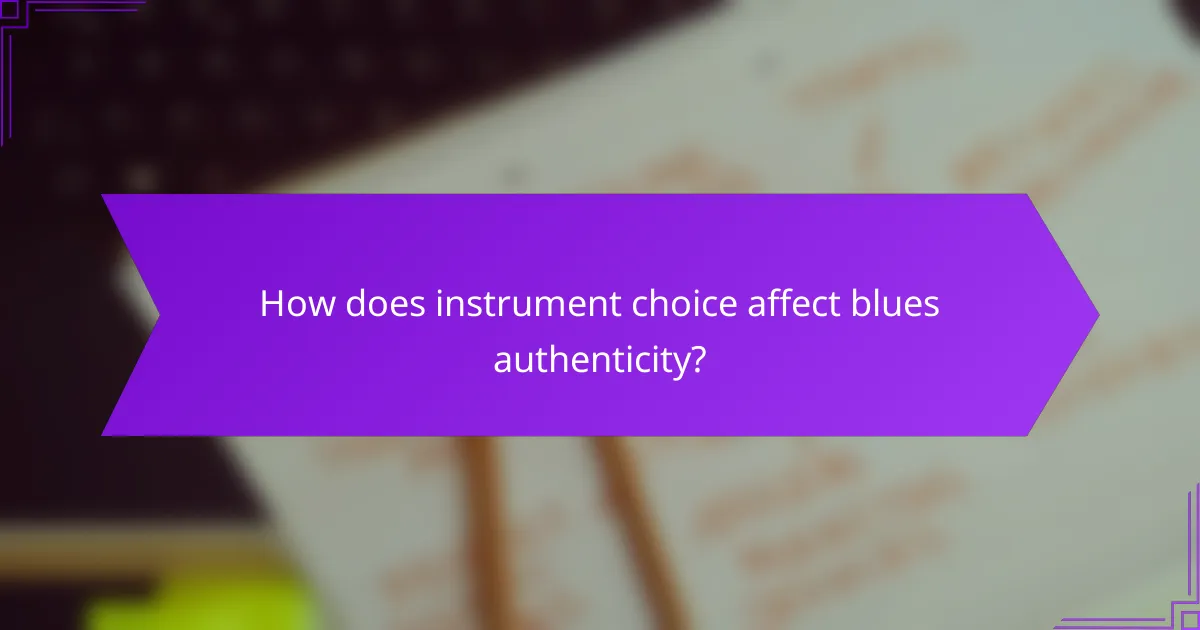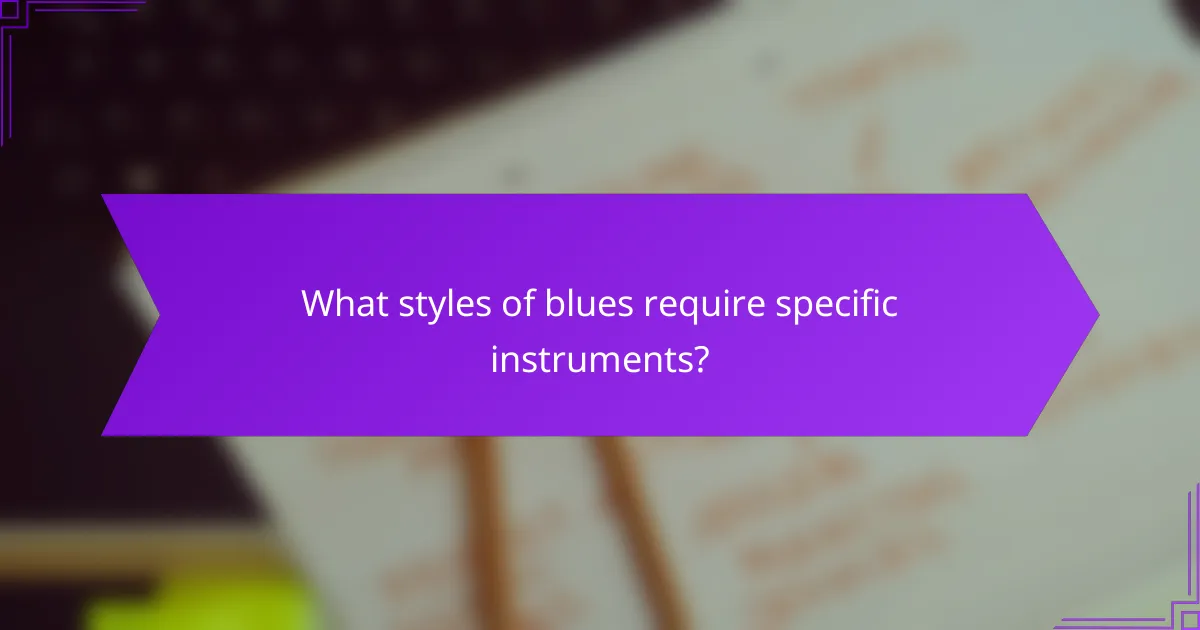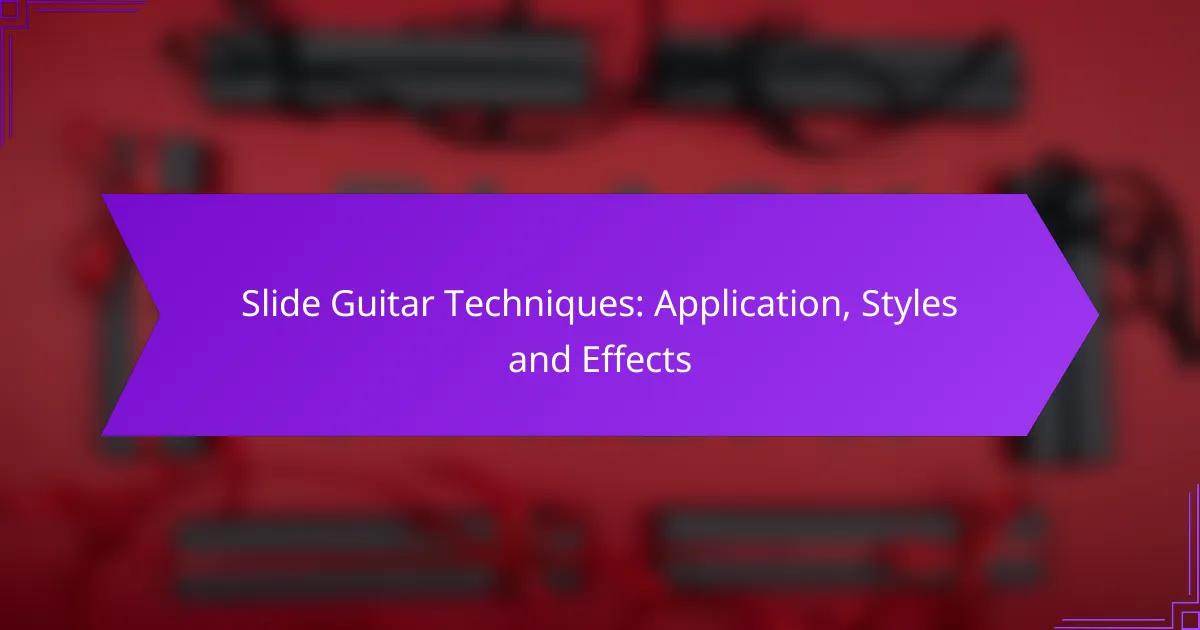Choosing the right instruments is crucial for capturing the authentic sound and style of blues music. Electric guitars, harmonicas, and semi-hollow body guitars each offer unique tonal qualities that define the genre. By understanding the specific requirements of different blues styles, musicians can select the tools that will best express their artistic vision and connect with listeners.

What are the best instruments for authentic blues sound?
The best instruments for achieving an authentic blues sound include electric guitars, harmonicas, and semi-hollow body guitars. Each instrument contributes unique tonal qualities that define the blues genre, making them essential for any aspiring blues musician.
Fender Stratocaster
The Fender Stratocaster is a staple in blues music, known for its bright, clear tone and versatility. Its three single-coil pickups offer a range of sounds, from sharp and biting to smooth and mellow, making it suitable for various blues styles.
When choosing a Stratocaster, consider models with a rosewood fretboard for a warmer tone. Additionally, the guitar’s contoured body provides comfort during long playing sessions, which is beneficial for live performances.
Gibson Les Paul
The Gibson Les Paul is renowned for its rich, full sound and sustain, making it a favorite among blues guitarists. Its humbucker pickups deliver a thicker tone that excels in both lead and rhythm playing.
For blues, look for a Les Paul with a lighter weight and a vintage-style neck, which can enhance playability. The combination of mahogany body and maple top contributes to its signature sound, ideal for expressive solos.
Hohner Marine Band Harmonica
The Hohner Marine Band Harmonica is a classic choice for blues harmonica players, celebrated for its rich, warm sound. This diatonic harmonica is designed for bending notes, a technique crucial in blues music.
When selecting a Marine Band, consider the key that matches your guitar or band setup. The 10-hole model is standard and allows for easy playability, making it a great option for beginners and seasoned players alike.
Gretsch G2622 Streamliner
The Gretsch G2622 Streamliner is a semi-hollow body guitar that offers a unique blend of warmth and clarity, perfect for blues. Its Broad’Tron pickups provide a punchy sound that cuts through the mix, making it ideal for both rhythm and lead playing.
This guitar’s stylish design and comfortable neck make it appealing for long jam sessions. Additionally, its affordability compared to other semi-hollow guitars makes it an attractive option for those starting in blues.
Epiphone Dot
The Epiphone Dot is another excellent semi-hollow body guitar that captures the essence of blues music. With its classic design and versatile sound, it is often favored for its affordability without sacrificing quality.
Look for the Dot with Alnico Classic pickups, which provide a warm tone suitable for blues. Its lightweight body and smooth neck make it easy to handle, allowing for expressive playing during performances.

How does instrument choice affect blues authenticity?
The choice of instruments significantly influences the authenticity of blues music. Selecting the right instruments can enhance the genre’s traditional sound and emotional depth, making it resonate more with listeners.
Influence of guitar type on tone
The type of guitar used in blues can dramatically affect its tone and overall sound. Hollow-body guitars, for instance, produce a warm, rich tone that is often associated with classic blues, while solid-body guitars offer a sharper, more aggressive sound suitable for modern styles.
When choosing a guitar, consider factors like wood type and pickup configuration. For example, a guitar with single-coil pickups typically delivers a brighter sound, while humbuckers provide a thicker, more powerful tone. Experimenting with different guitars can help you find the one that best fits your style.
Role of harmonicas in blues
Harmonicas play a crucial role in blues music, adding a distinct, soulful quality to the sound. Often referred to as “blues harps,” these instruments can evoke deep emotions and complement guitar melodies effectively.
When selecting a harmonica, consider the key of the song and the type of harmonica, such as diatonic or chromatic. Diatonic harmonicas are commonly used in blues for their expressive bends and overblows, while chromatic harmonicas offer a wider range of notes. Understanding how to use harmonicas can enhance your blues performances.
Impact of vintage instruments
Vintage instruments can significantly enhance the authenticity of blues music. Instruments that have aged naturally often possess unique tonal qualities that newer models may lack, contributing to a richer sound.
When considering vintage instruments, be mindful of their condition and playability. While they can be more expensive, investing in a well-maintained vintage guitar or harmonica can provide a distinct character that resonates with the blues tradition. Look for reputable dealers or auction sites to find authentic vintage pieces.

What styles of blues require specific instruments?
Different styles of blues music often call for distinct instruments that shape their unique sound and character. Understanding these requirements can help musicians choose the right tools to authentically express the blues genre they wish to explore.
Chicago blues and electric guitars
Chicago blues prominently features electric guitars, which deliver a powerful, amplified sound essential for the genre’s energetic performances. Instruments like the Fender Stratocaster and Gibson Les Paul are popular choices, known for their versatility and ability to produce a range of tones.
When selecting an electric guitar for Chicago blues, consider the pickup configuration and tone controls, as these features significantly influence sound. Additionally, using effects pedals can enhance the guitar’s expressiveness, allowing for a more dynamic performance.
Delta blues and acoustic guitars
Delta blues is characterized by its raw, emotional sound, typically produced with acoustic guitars. Instruments such as the National resonator guitar or a simple dreadnought acoustic are commonly used, as they provide a rich, resonant tone that complements the storytelling aspect of the music.
For those playing Delta blues, focusing on fingerpicking techniques and slide guitar can enhance authenticity. It’s important to choose strings that suit your playing style; lighter gauge strings can facilitate easier bending, while heavier ones may produce a fuller sound.
Jump blues and saxophones
Jump blues integrates a lively rhythm with a strong horn section, prominently featuring saxophones. Instruments like the alto or tenor saxophone are essential for creating the upbeat, swinging sound that defines this style.
When incorporating saxophones into jump blues, consider the arrangement and interplay with other instruments, such as the piano and guitar. A solid understanding of jazz and swing rhythms will help in crafting engaging solos and harmonies that elevate the overall performance.

How to choose the right blues instrument for beginners?
Choosing the right blues instrument as a beginner involves considering factors like budget, brand reputation, playability, and personal sound preferences. Start by identifying what type of instrument resonates with you, whether it’s a guitar, harmonica, or keyboard, and then evaluate options within your price range.
Consider budget and brand
Your budget is a crucial factor when selecting a blues instrument. For beginners, instruments typically range from around $100 to $500, depending on the type and brand. Well-known brands often provide better quality and reliability, so consider investing in a reputable name even if it means spending a bit more.
Research brands that are recognized in the blues community, such as Fender for guitars or Hohner for harmonicas. These brands often have entry-level models that balance quality and affordability, making them suitable for beginners.
Evaluate playability and comfort
Playability refers to how easy and enjoyable an instrument is to play. For beginners, it’s essential to choose an instrument that feels comfortable in your hands. For example, a guitar with a slim neck may be easier to handle than a wider one, especially for those with smaller hands.
Try out different instruments in a store to see which feels best. Pay attention to the weight, size, and action of the strings. Instruments that are too heavy or difficult to press can discourage practice, so prioritize comfort to enhance your learning experience.
Assess sound preferences
Your sound preferences will significantly influence your choice of blues instrument. Different instruments produce distinct tones; for instance, electric guitars offer a sharper sound, while acoustic guitars provide a warmer tone. Harmonica can add a unique texture to blues music, making it a popular choice as well.
Listen to various blues recordings to identify the sound that resonates with you. Once you have a clear idea of your preferred tone, look for instruments that can replicate that sound. This will help ensure that you enjoy playing and practicing, which is vital for your development as a musician.

What are the key attributes to consider in blues instruments?
When selecting instruments for blues music, focus on sound quality, tonal range, playability, and authenticity. These attributes significantly influence the overall feel and expression of the music, helping to create that signature blues sound.
Sound quality and tonal range
Sound quality and tonal range are crucial in blues instruments, as they directly affect the emotional depth of the music. Instruments that produce rich, warm tones tend to resonate better with the blues genre, while those with a broader tonal range allow for more expressive playing.
For guitars, look for models with solid wood bodies, as they typically offer superior sound quality compared to laminate options. Electric guitars with humbucker pickups can deliver a thicker tone, while single-coil pickups provide a brighter sound, both of which can be effective in blues.
In addition to guitars, consider harmonicas and pianos, which also play significant roles in blues music. A harmonica with a good tonal range can enhance the emotional expression, while a well-tuned piano can provide a rich harmonic foundation for blues compositions.



